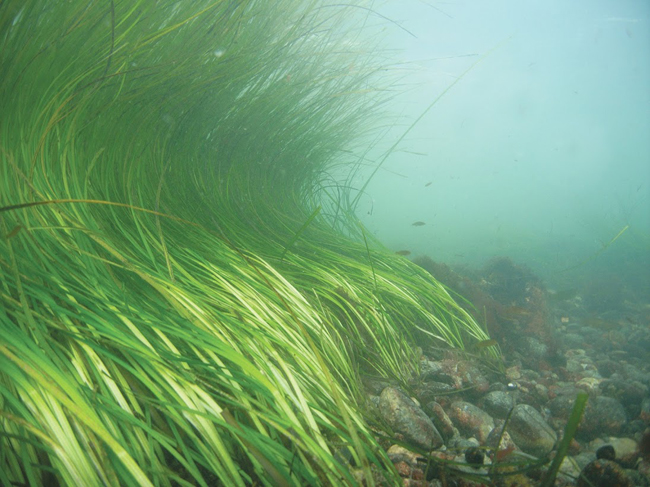
An eelgrass bed off of Fishers Island, NY. Credit: CCE Suffolk County Marine Program
— Published for Stony Brook University's E-news Site, Happenings
Stony Brook, NY, February 22, 2021 - A study of ocean acidification by Christopher Gobler, Endowed Chair of Coastal Ecology and Conservation in Stony Brook’s School of Marine and Atmospheric Sciences, is one of eight research projects that will examine various facets of the water chemistry and habitat quality of Long Island Sound and is supported by federal funding through the Long Island Sound Study Research Grant Program.
Ocean acidification is absorption of carbon dioxide gas from the atmosphere that produces a pH imbalance in our waters, making them more acidic. Seagrasses may provide areas of more favorable conditions from acidified waters for certain species such as oysters, clams, mussels and scallops. Gobler’s research will measure the ability of cultured seaweed and shellfish to remove nitrogen, combat ocean acidification, improve water quality and benefit aquaculture.
The project is supported by a partnership of the Sea Grant programs of Connecticut and New York (CTSG and NYSG, respectively,) and the U.S. Environmental Protection Agency (EPA) through the Long Island Sound Study (LISS) and will span two years, with work slated to begin in Spring 2021.
For more details, see the full press release.
The eight research projects are the latest to be awarded through the Long Island Sound Study Research Grant Program, run by NYSG and CTSG since 2008. Including the new awards, the program has funded ecological research in more than 30 areas. It represents the largest research investment into the Sound, designated an estuary of national significance and one of the most valuable natural resources for both states.
More Info: Long Island Sound Study
Long Island Sound is one of the 28 nationally designated estuaries under the National Estuary Program (NEP), which was established by Congress in 1987 to improve the quality of Long Island Sound and other places where rivers meet the sea.
The Long Island Sound Study is a cooperative effort sponsored by the Environmental Protection Agency and the states of Connecticut and New York to restore and protect the Sound and its ecosystems. The restoration work is guided by a Comprehensive Conservation and Management Plan under four themes: Clean Waters and Healthy Watersheds; Thriving Habitats and Abundant Wildlife; Sustainable and Resilient Communities; and Sound Science and Management.
For more on what you can do to make a difference, click over to the "Get Involved" or "Stewardship" sections of the Long Island Sound Study's website. News on the Long Island Sound Study can also be found in New York Sea Grant's related archives.
If you would like to receive Long Island Sound Study's newsletter, please visit their site's homepage and sign up for the "e-news/print newsletter" under the "Stay Connected" box.
More Info: Connecticut Sea Grant
Connecticut Sea Grant (CTSG), located at the UConn Avery Point campus, is a state and federal partnership funded by the National Oceanic and Atmospheric Administration (NOAA) and the University of Connecticut. CTSG, which in 2019 celebrated its 30th anniversary as a Sea Grant College Program, works to achieve thriving coastal and marine ecosystems and communities by supporting local and national research, outreach and education programs. CTSG accomplishes this by providing objective, science-based information to encourage individuals and organizations to make informed decisions, communicating scientific findings in a practical manner helpful to diverse audiences, and helping others balance the use and conservation of coastal ecosystems. Ultimately CTSG’s activities increase the resilience of the coastal communities, economies and ecosystems.
The program has three foci: research, outreach, and education. Outreach efforts include the CTSG Extension Program, and its Communications Program. The program also has an administrative staff committed to promoting understanding of the Sea Grant mission.
For more, visit seagrant.uconn.edu.
More Info: New York Sea Grant
New York Sea Grant (NYSG), a cooperative program of Cornell University
and the State University of New York (SUNY), is one of 34 university-based
programs under the National Oceanic and Atmospheric Administration’s
National Sea Grant College Program.
Since 1971, NYSG has represented a statewide network of integrated
research, education and extension services promoting coastal community
economic vitality, environmental sustainability and citizen awareness
and understanding about the State’s marine and Great Lakes resources.
Through NYSG’s efforts, the combined talents of university scientists
and extension specialists help develop and transfer science-based
information to many coastal user groups—businesses and industries,
federal, state and local government decision-makers and agency managers,
educators, the media and the interested public.
The program maintains Great Lakes offices at Cornell University, University at Buffalo, SUNY Oswego and the Wayne County Cooperative Extension office
in Newark. In the State's marine waters, NYSG has offices at Stony Brook
University in Long Island, Brooklyn College and Cornell Cooperative
Extension in NYC and Elmsford and Kingston in the Hudson Valley.
For updates on Sea Grant activities: www.nyseagrant.org has RSS, Facebook, Twitter, Instagram, and YouTube links. NYSG offers a free e-list sign up via www.nyseagrant.org/nycoastlines for its flagship publication, NY Coastlines/Currents, which is published quarterly.